I first watched this video in 2015 and recently watched it again: Brené Brown's Listening to Shame video. It is one of my favorite TED Talks. Brené talks about shame and how we say to ourselves, "We Are NEVER Good Enough or Who Do We Think We Are." Isn't that a great way of looking at the underlying statements we say to ourselves from shame? These statements are just a few of the powerful statements in this video.
As a Professional Organizer (P.O.) for 25+ years, I have encountered similar comments when telling someone what I do for a living. They feel that a P.O. will judge them for how they have lived their lives. And, if they accept help, it means they can't do it all (shame), which means they are stupid or unintelligent (shame) because they can't do it all.
Then, using my motherly voice, I say, "My mission is to help others by inspiring them to organize and make their lives easier to manage without judgment." This usually helps them put their cluttered home shame aside, be more open, and allow me to see how they live. This is a big step for my clients, so I take it very seriously. I especially do not want them to feel pressured or criticized for their situations.
What is clutter shame?
When I first meet with my client for the Solutions Consultation session, I usually hear a common statement from them, such as, "I am so ashamed about this..." or "I am so embarrassed by this..." Many of them feel like their parents will punish them because of the state of a room or area. This clutter shame they experience stops them from making a change in their home because they do not want to face something that they have deemed as a bad thing they have done.
How does clutter shame impact lives
Shame will stop you from decluttering a home. There are several ways that clutter shame will impact lives directly and indirectly. Below are some of them.
- Anxiety and stress: You can easily get overwhelmed when your home is cluttered. When you walk into a house after a hard day at work, tired and just wanting to relax, you see piles of items that need to be put away. You may see the clutter, become anxious, and feel ashamed that you did not finish the task over the weekend.
- You feel alone and isolated: You may not want people to come over and turn away spending time with family and inviting people because of your clutter shame.
- Sleep issues: The distraction of clutter in a bedroom can be devastating to your sleep. Read more about my experience with clutter in my bedroom when we were remodeling my daughter's room.
- Change in behaviors: Because of the clutter shame, you may change your everyday habits to work around those feelings, unconsciously stopping actions that will improve your life and reverting to actions that result in procrastination.
- Increase in spending: You may find that clutter shame changes your spending habits because you choose not to go through the cluttered space; you spend money on something just because you do not want to declutter or find an item.
- Increase in Overeating: Sometimes, the clutter in your kitchen may overwhelm you. Buy take-out, not go grocery shopping, which can result in impulse buying and increased overeating.
- Clutter Shame can increase cortisol levels. Cortisol is a hormone produced by the adrenal glands. It is known as the stress hormone because it is released when you experience stress in your life.
The above are just some of the ways that clutter shame affects you. Can you relate to any of these?
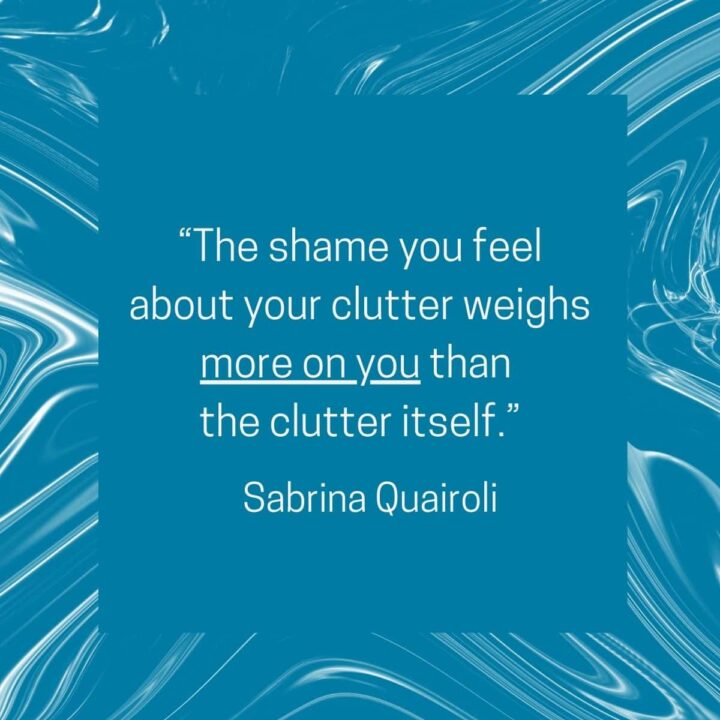
Stuff is just stuff.
Remember that stuff is stuff. It isn't always needed. You may need it now, but not a year or five years from now. The stuff is the means to an end. You need it for a purpose, whether to remind you of a happy memory or to do a particular task. Keep this in mind when you look at your stuff; your clutter will make getting rid of things more manageable.
How to combat clutter shame
Clutter shame can be challenging to manage. It can stop you in your tracks for a better life. Below are some ways to combat this type of shame.
Recognize that you are embarrassed by your clutter.
Tell yourself that clutter is just indecision, and start by deciding what to do with every item you have. You could donate or trash it, store it in long-term storage, or take action to complete an uncompleted task.
Admit to yourself that you need help.
It is OK to ask for help. Forget the internal monologue that says you must do it all yourself or you are not strong. You are a strong person, and a strong person is the one who can ask for help.
Talk to close family and friends.
Talking through what bothers you about your space may help you clarify your goals for your life and home.
The traditional way of decluttering may not be your way to declutter.
Remember, there are many ways to do tasks and organize spaces. So, remind yourself that it is OK to change processes or rearrange spaces your way, and it may not be how a Professional Organizer would do it. The goal is to have a maintainable space and make it easy for YOU and YOUR Family to find things.
Taking Before and After Photos
This is one of my favorite things to do with clients. While none of my clients want to see the before picture, they are so proud of themselves when they see the before and after photos. I usually do a side-by-side or top-and-bottom image so they can see the transformation easily. It motivates them to continue clearing the clutter.
Decluttering is a process and needs to be revisited
Lastly, remember that clutter is not permanent. If it bothers you, revisit it and declutter the space.
There is no need for clutter shame; we all experience it to various degrees. The good news is that it is a feeling, and feelings are not permanent. Remember: The items are not judging you, so stop judging yourself.
Let's continue the conversation: what do you say to yourself when you look at clutter in your home? Please leave a comment below.
How can I help? If you are a DIYer and want guidance on decluttering and organizing your space, visit my virtual organizing session service and contact me.
Below are several decluttering posts to help your journey to a less clutter-free home.
Please note that these are affiliate links through Amazon (affiliate). At no additional cost to you, I will earn affiliate fees if you decide to make a purchase.
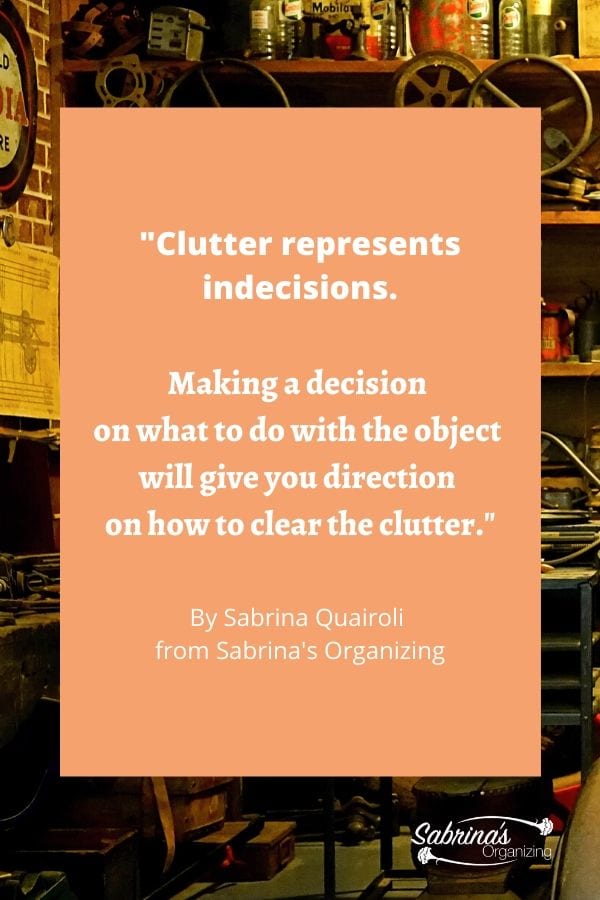
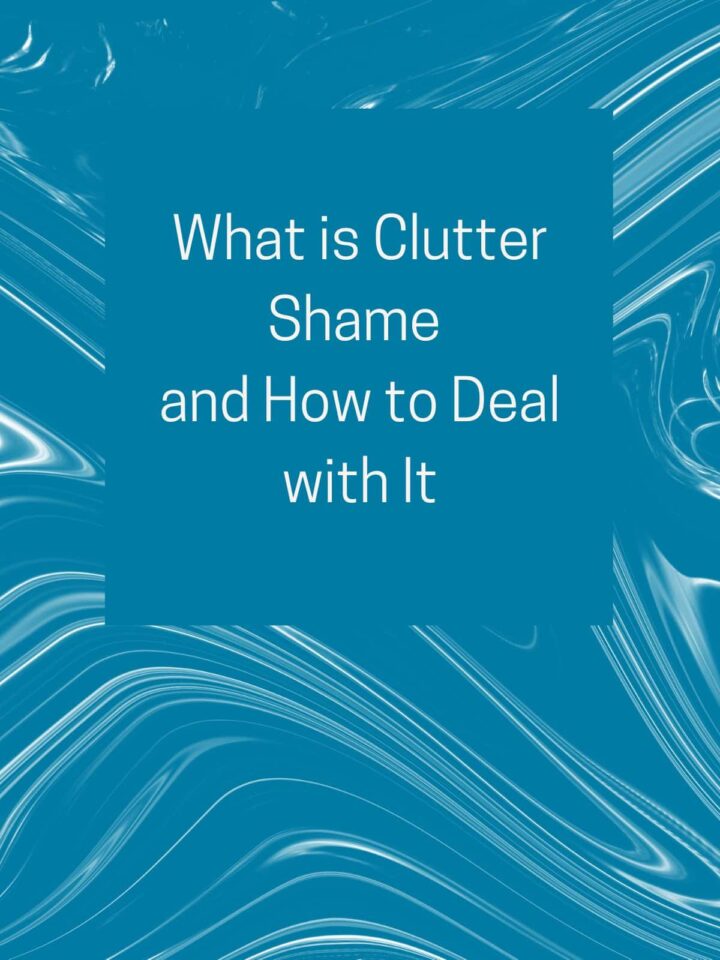


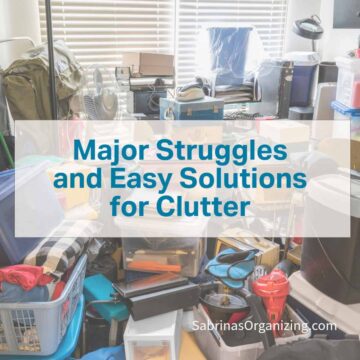
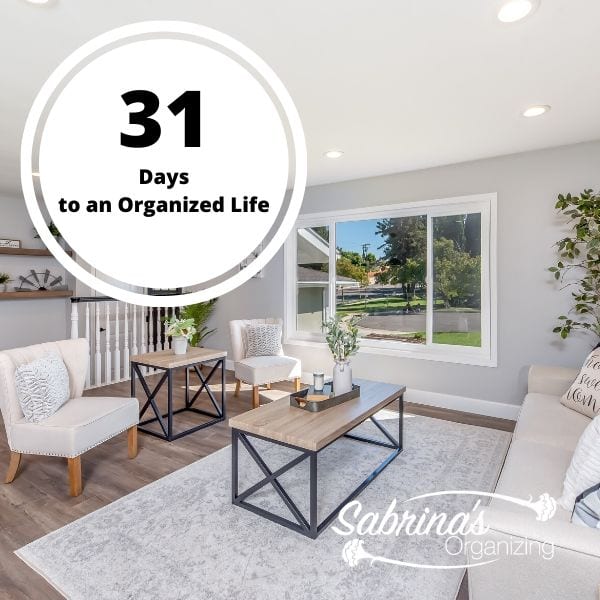
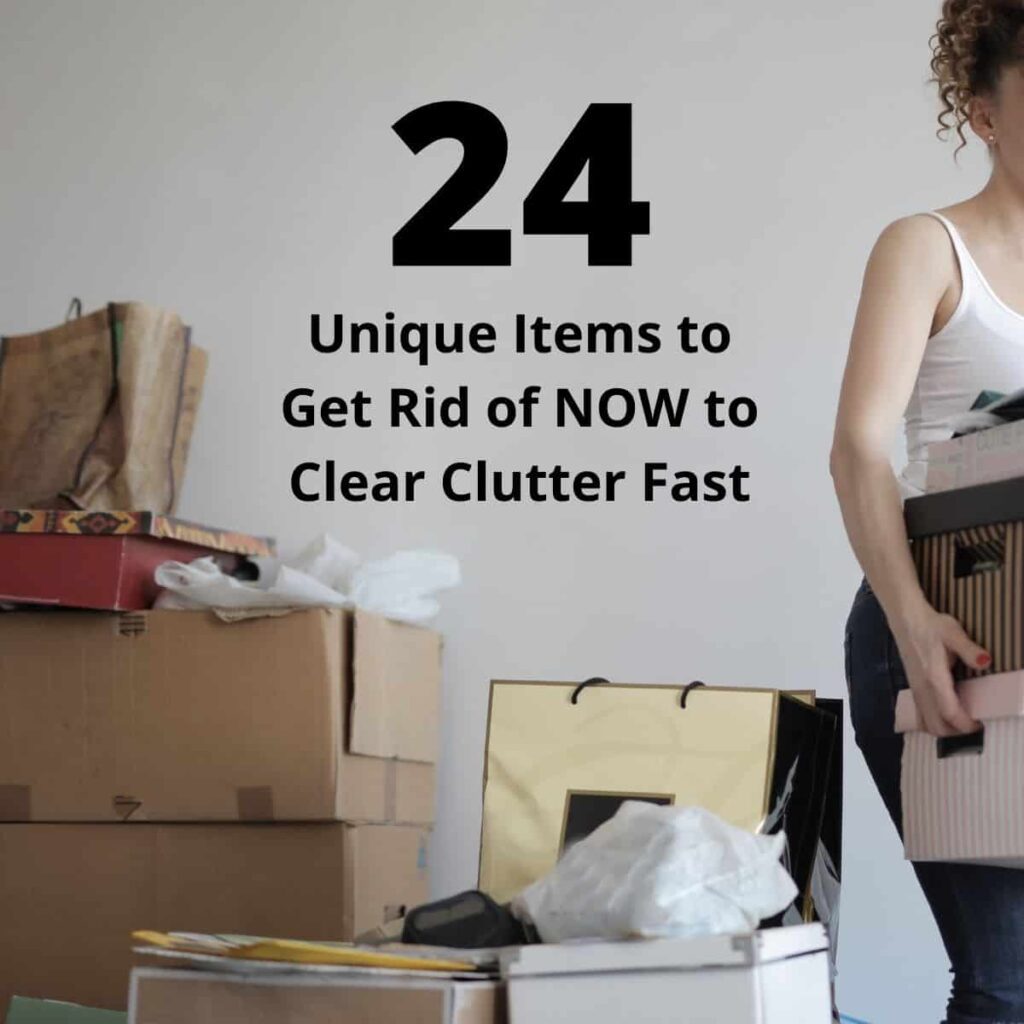


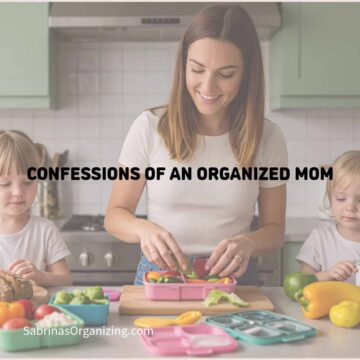

Cena from SaneSpaces.com says
Shame is the part of the cycle that is so difficult. One way to side-step shame almost instantly is to step into gratefulness... it is impossible to be shameful and grateful at the same time. Thanks Sabrina
Sabrina says
Great point, Cena! Thanks for sharing.
Rose M Griffith says
I've moved too many times to be a collector of cutter (stopped counting after 28 post college--1981--moves), but I know those folks and have compassion for them. I also have a professional organizer in my life and have seen how she approaches people with collection issues. Even for someone well organized, it is good to hear these lessons and stop occasionally and think about: why is that Rubbermaid tub still full of stuff I meant to go through last winter? good post to provoke!
Kim says
Hi Sabrina,
I love this!! I think that most of us Professional Organizers feel honoured that we are able to help those in need. I know I do. I love your quotes and I have listened to Brene Brown talk on Vulnerability which is awesome. I am going to check this talk out as well. Thanks so much
Autumn Leopold says
I think people get confused that some clutter is a party of life and really is revolving. It's the clutter you let build up around you that isn't revolving, that you must off doing anything about for emotional reasons, or you have a habit of buying things you don't need. That kind of clutter is the clutter that makes us feel bad. But it's really the feelings behind those piles that cause us the shame.
Great quote,"Shame you have about the clutter weighs on you more than the clutter itself."
William Rusho says
Another great post,
I know sometimes my clutter gets to much for me.
It is time, and energy that keeps me from taking care of it.
Seana Turner says
The shame is such a heavy burden to bear. I love that we have the chance to come into their lives, provide solutions and help manage this burden. It's the same way people feel when they are overweight, in debt, or addicted.
Jill Robson says
Great article Sabrina, I hear that all the time, when I meet new clients. It is a "shame" that so many people are putting off getting organized because of the shame they feel, and of being judged.
Beth Niebuhr says
I always decide to spend a few minutes on it every day but I seldom do.
Hazel Thornton says
This is so true! My clients who have been brave enough to ask me for help can see that I do not judge them for their clutter. I see it only as a problem to be solved. But for those who are still suffering, your tips will surely help!
Mina Joshi says
I don't like clutter either so every so often I tend to collect stuff I don't need and take it either to the recycling place, the Charity shop or put it up for sale on EBay. I try not to get too tempted by the sales but I do tend to end up buying a lot of props for my blog and am forever looking for space to store it.
Jacqueline Gum says
Personally, I have never had a clutter problem because I am a complete neat freak! But I wish I'd read these wise words when friends have asked me to help them with their clutter problems over the years:) I'll remember them!
Lenie says
I really like the statement "The stuff is a means to an end." So often people forget that and fill their homes with stuff just 'because'. I know someone who can't resist a bargain and will buy a piece of clothing and then never wear it. In the meantime it just adds to the crowding of her closet. When I told her I had three pairs of jeans - one for working in, one black and one white pair, she wondered how I did it. Pretty easy. I don't need more.
angela says
Thankyou for posting the above article- it has helped me to recognise that my clutter problem is temporary.